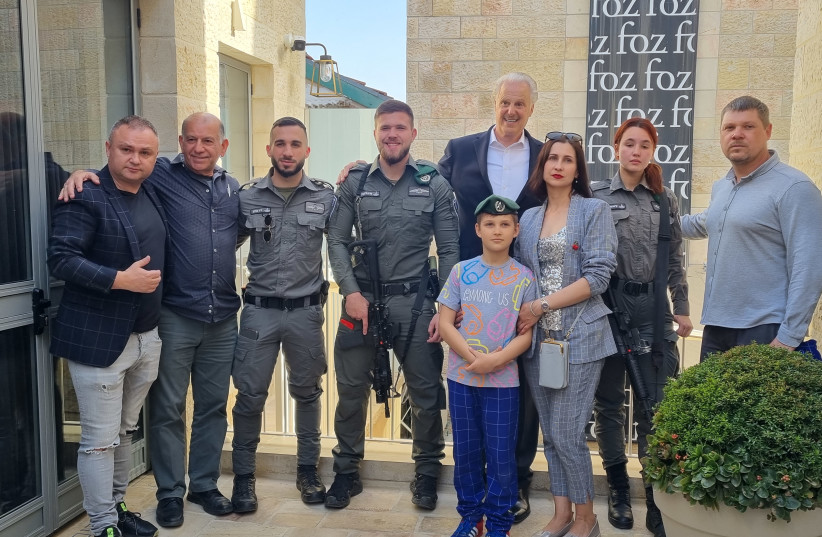Eliyahu Grinkevich had not seen his family in the several years since he left the country of his birth, Ukraine.
For more stories from The Media Line go to themedialine.org
Four years ago, Grinkevich emigrated alone from Ukraine to Israel and enlisted in the Border Police, leaving his parents and other loved ones behind.
Following a harrowing week of phone calls and after enlisting the help of the Chabad Jewish organization in Kyiv, Grinkevich’s family finally managed to escape Ukraine in mid-March and recently had a long-awaited, tearful reunion at Israel’s Ben Gurion Airport.
“Up until now I was lone soldier,” Grinkevich told The Media Line, using the term for Israeli servicemen without any family members in the country. “When we knew that a war was about to start, I told my parents that they must come to Israel so that they won’t have problems. My mother didn’t want to move here because she didn’t believe that the Russians would manage to reach Kyiv.”
It took nearly a week for his loved ones to make it out of the country and reach Budapest, Hungary, Grinkevich recounted.

“I spoke to them every day and called them every 20 minutes,” he said. “When I would see on the news that there was a siren sounding in Kyiv then I would call. I didn’t sleep for days. Truly, it was hard.”
His family is now doing much better, he said, noting that he was very grateful that they had managed to make it to Israel.
Grinkevich spoke to The Media Line on the sidelines of a special event held in solidarity with the Ukrainian people at the Friends of Zion Museum in Jerusalem on Monday. The museum has launched a global campaign intended to raise funds for Ukraine and has so far delivered 19 tons of food to war-torn areas of the country; museum officials hope to deliver a further 40 tons in the coming month.
Several Holocaust survivors from Ukraine attended the event, as well as Ukrainian children who were recently rescued from the war and brought to safety in Israel.
Shlomo Wilhelm, the Chabad chief rabbi of Zhytomyr and Western Ukraine, helped bring dozens of children from the Alumim Jewish orphanage in Zhytomyr to Israel when the Russian invasion began. The children are currently staying at the Nes Harim Field and Forest Education Center just outside Jerusalem, which is operated by the Keren Kayemeth LeIsrael-Jewish National Fund (KKL-JNF).
Wilhelm, who also helped many Jewish families evacuate conflict areas in Ukraine, told The Media Line what made him decide to flee Ukraine, a country he had lived in for 28 years.
“My wife was about to fly to Belgium and I was fast asleep,” he related. “At a quarter to 5 in the morning, I got a call from my wife: ‘The flight has been canceled. The war has begun,’ she told me.”
“I immediately woke up and then heard sirens and a missile hitting nearby Zhytomyr,” he continued. “In that moment I went from being an optimist to being a pessimist. That was the moment that changed my outlook completely.”
According to Wilhelm, the missile struck an army base that was located right next to the orphanage and woke all the children there.
“I decided then that I would do everything in my power to get the children and other Jews out of here,” he said. “I didn’t want the children to know what war is and to have to hear sirens. We had given these kids our souls, to try to make them happy.”
Locals in the area initially laughed at the rabbi’s reaction and told him that they believed there was no reason to leave. Meanwhile, it took the orphans nearly 20 hours to reach the border with Romania. The rabbi stayed behind in Zhytomyr to continue to help put people on buses.
In total, some 150 members of the Zhytomyr Jewish community, including 70 orphans, flew on a special El Al flight from Romania to Israel last month.
11-year-old Yuda said that the experience was scary but that, overall, he felt fine.
“We could hear shooting but aside from that, it was ok,” Yuda told The Media Line.
“The food is really great over here,” he added.
More than 10,000 new immigrants have come to Israel since the beginning of the Russian invasion, according to Aliyah and Integration Minister Pnina Tamano-Shata. Of those, over two-thirds are Ukrainian refugees, while the rest are immigrants from Russia and Belarus. Israel is expecting a further 60,000 immigrants to arrive from the former Soviet Union in the coming months.
